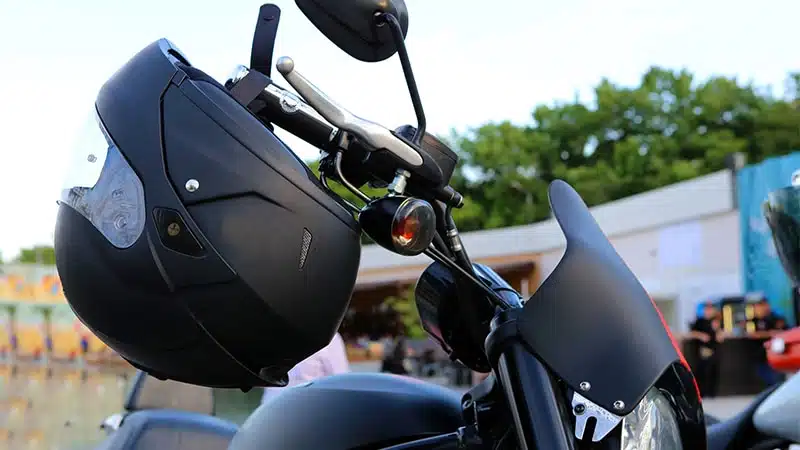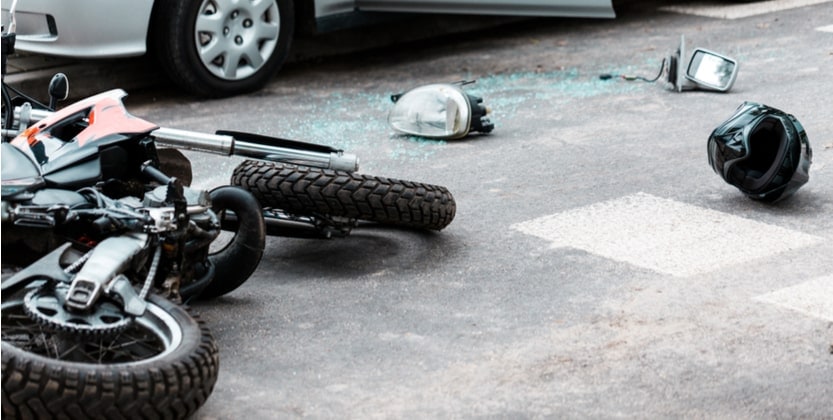Motorcycle accidents typically result in more severe injuries than other vehicle collisions due to the minimal protection available to riders. Without the benefit of safety features like airbags, seat belts, and crumple zones, motorcyclists absorb the full impact of a collision with their bodies. This direct exposure often leads to catastrophic injuries, even in accidents that would be considered minor for passenger vehicles.
Traumatic Brain Injuries
Traumatic brain injuries (TBIs) are among the most serious consequences of motorcycle accidents, even when riders wear proper helmets. While helmets significantly reduce the risk of fatal head trauma, they cannot eliminate it entirely, especially in high-speed collisions or multiple-impact scenarios. These injuries range from mild concussions to severe brain damage that can permanently alter cognitive function, memory, personality, and motor skills.
The long-term implications of a TBI often extend far beyond initial hospital care, potentially requiring ongoing rehabilitation, occupational therapy, cognitive therapy, and lifestyle modifications. Many TBI victims struggle with concentration, emotional regulation, and the ability to return to their previous work and daily activities.
Spinal Cord Injuries and Paralysis
Spinal cord injuries occur frequently in motorcycle crashes when riders are thrown from their bikes or experience direct impact to their back or neck. These injuries can result in partial or complete paralysis, affecting not only mobility but also bodily functions, sensation, and independence. Depending on the location and severity of the spinal damage, victims may face paraplegia, quadriplegia, or other permanent neurological impairments.
The financial burden of spinal cord injuries is substantial, with lifetime care costs potentially reaching millions of dollars for severe cases. These expenses include specialized medical care, adaptive equipment, home modifications, personal care assistance, and lost earning potential.
Our personal injury lawyers work diligently to secure compensation that accounts for these long-term costs, consulting with medical economists and life care planning experts to accurately project future expenses.
Road Rash and Orthopedic Injuries
Road rash occurs when a rider’s skin makes direct contact with the road surface during a crash, causing painful abrasions that can penetrate multiple layers of tissue. What might seem like a superficial injury can lead to serious complications, including infection, permanent scarring, nerve damage, and disfigurement. Severe cases may require skin grafts, multiple surgical procedures, and extensive wound care to prevent complications and promote healing.
Orthopedic injuries—including complex fractures, joint dislocations, and torn ligaments—are also common in motorcycle accidents. These injuries often require surgical intervention, metal hardware implantation, and lengthy rehabilitation periods.
Many riders experience chronic pain, limited mobility, and reduced strength long after their bones have healed. These physical limitations can prevent return to previous employment, recreational activities, and normal daily functioning, significantly impacting quality of life and economic security.
Amputation and Limb Loss
Catastrophic motorcycle accidents frequently result in traumatic amputation or injuries so severe that surgical amputation becomes necessary. The violent forces involved in motorcycle crashes can cause limbs to be severed during impact or crushed beyond repair. These devastating injuries instantly transform every aspect of a victim’s life, requiring not only immediate emergency care but also comprehensive long-term support.
The physical challenges of limb loss extend far beyond the initial recovery period. Many amputees undergo multiple surgeries, including revisions to the amputation site and procedures to prepare for prosthetic fitting. Prosthetic devices themselves represent a significant ongoing expense, with specialized limbs for different activities costing tens of thousands of dollars and requiring replacement every 3-5 years.
The psychological and emotional trauma associated with limb loss can be equally significant. Many amputees experience grief, depression, body image issues, and profound life adjustments as they relearn basic tasks and adapt to new limitations. At Weinstein Legal Team, we ensure compensation packages for amputation victims include provisions for cutting-edge prosthetic technologies, psychological support, occupational therapy, and the many home and vehicle modifications necessary for maximizing independence and quality of life.
Steps to Take After a Motorcycle Accident in Florida
The immediate hours after a motorcycle accident are critical to both your physical and financial recovery. Here are some of the steps you can take to ensure your safety and to help your legal case.
1. Get to a Place of Safety
Unless you were thrown completely from the roadway, you’re not safe. Other drivers may not see you or the motorcycle, and you could be exposed to a second accident. Try to move to a position of safety if you’re not able to.
2. Call 911
Don’t assume someone else has called the police. Call 911. Remain calm and tell the dispatcher your location, injury types, and the description of other vehicles involved.
3. Talk to Witnesses
Witnesses will usually leave as long as you seem coherent and likely to survive. Try to get them to stay until the police can arrive. If not, take down their information or ask them to take a photograph of their driver’s license so you have their information.
4. Use Your Phone to Take Pictures
It will be much easier for your attorney to reconstruct the accident if they have photographic documentation of the scene. From a safe vantage point, take images of your injuries, damage to other vehicles, your motorcycle, damage to your helmet or clothing, locational indicators, etc.
5. Get Medical Attention
Allow EMTs to examine you on scene. If they want to transport you, allow them to take you to the emergency room. If not, follow up with your doctor as soon as possible.
6. Talk to an Attorney
It’s never too soon to involve an experienced motorcycle accident attorney in your case. Before you accept an inadequate settlement offer from an insurance company, talk to a lawyer about your claim. Once you sign a waiver of liability, you won’t be able to seek additional compensation.
Types of Compensation Available for Motorcycle Accident Victims
Motorcycle accident victims in Florida may be eligible for various types of compensation, depending on their specific circumstances. Our Florida motorcycle accident injury lawyers work diligently to identify and pursue all available damages, ensuring nothing is overlooked in your case. We believe in seeking full and fair compensation that addresses both current losses and future consequences of your injuries.
Economic Damages
Economic damages encompass all financial losses resulting from your motorcycle accident. Current medical expenses form the foundation of these damages, including emergency care, hospitalization, surgeries, medication, diagnostic tests, and rehabilitation services. For severe injuries, future medical needs often dwarf initial treatment costs and may include ongoing therapy, additional surgeries, medication, mobility aids, and in-home care services.
Motorcycle accidents frequently result in extended work absences or permanent inability to return to previous employment. We document all lost income, including wages, bonuses, commissions, and self-employment earnings. For permanently disabled clients, we calculate the difference between pre-accident earning capacity and post-accident employment prospects over your expected work life.
This analysis includes consideration of career advancement opportunities, skill development, and other factors that would have affected your earnings trajectory.
Additional economic damages may include property damage to your motorcycle and gear, transportation costs to medical appointments, home and vehicle modifications to accommodate disabilities, and household services you can no longer perform yourself. These expenses add up quickly and should be included in any comprehensive settlement or verdict.
We maintain detailed records of all accident-related expenditures to ensure they’re properly accounted for in your compensation package.
Non-Economic Damages
Non-economic damages address the personal, subjective impact of your injuries beyond financial losses. Pain and suffering compensation acknowledges the physical discomfort, pain, and distress you experience both immediately after the accident and on an ongoing basis. For many motorcycle accident victims with severe injuries, this pain becomes a constant companion that affects sleep, mood, and overall well-being.
Emotional distress often accompanies serious physical injuries, manifesting as anxiety, depression, post-traumatic stress disorder, or phobias related to riding or driving. These psychological impacts can be just as debilitating as physical injuries, affecting relationships, work performance, and enjoyment of life.
We work with mental health professionals to document these conditions and demonstrate their connection to the accident.
Loss of enjoyment of life compensates for activities, hobbies, and experiences you can no longer participate in due to your injuries. For motorcycle enthusiasts, the inability to ride again represents a significant loss beyond its practical implications. Similar losses might include sports activities, travel, physical play with children or grandchildren, and other meaningful life experiences.
Through detailed documentation of your pre-accident lifestyle and current limitations, we help quantify these deeply personal losses.
Wrongful Death Claims
When motorcycle accidents result in fatalities, surviving family members may pursue wrongful death claims. These claims provide compensation for the financial and emotional losses experienced by the family, including funeral expenses, medical costs prior to death, lost financial support, and loss of companionship, guidance, and emotional support.
The Weinstein Legal Team approaches wrongful death cases with particular sensitivity and compassion, understanding the profound grief families experience. We handle the legal complexities while allowing family members space to mourn.
Our goal is to secure financial stability for the family’s future while also achieving a sense of justice and accountability for the responsible parties. Though no compensation can truly address the loss of a loved one, these claims provide important practical support during an incredibly difficult time.
The Motorcycle Accident Claim Process
Understanding what to expect during the legal process helps clients feel more comfortable and confident as their case progresses. The motorcycle accident claim process typically begins with a free initial consultation where we evaluate your case and explain your legal options. During this meeting, we’ll discuss the accident circumstances, your injuries, and how the incident has affected your life.
If you choose to work with us, we’ll immediately begin our investigation and document collection process. This includes gathering police reports, medical records, witness statements, and physical evidence. We’ll also help coordinate your ongoing medical care and document how your injuries affect your daily life.
This early investigative work forms the foundation of your claim and helps us determine its potential value.
Begin Negotiations With The Insurance Company
Once we’ve built a strong case, we’ll submit a demand package to the responsible party’s insurance company. This comprehensive document outlines the facts of the accident, establishes liability, details your injuries and damages, and demands appropriate compensation. The insurance company typically responds with either an acceptance, rejection, or counteroffer, beginning the negotiation phase.
Throughout these negotiations, we keep you informed of all offers and provide advice on whether to accept or continue negotiating.
Taking The Case To Trial
If a fair settlement cannot be reached through negotiation, we prepare to take your case to court. While most motorcycle accident claims settle before trial, our willingness and ability to litigate often leads to better settlement offers. If the case does go to court, the trial can take anywhere from a couple of days to a couple of months depending on the complexity of the case.
Florida’s statute of limitations generally allows two years from the accident date to file a lawsuit, but we recommend starting the legal process much sooner to preserve evidence and witness recollections.
















